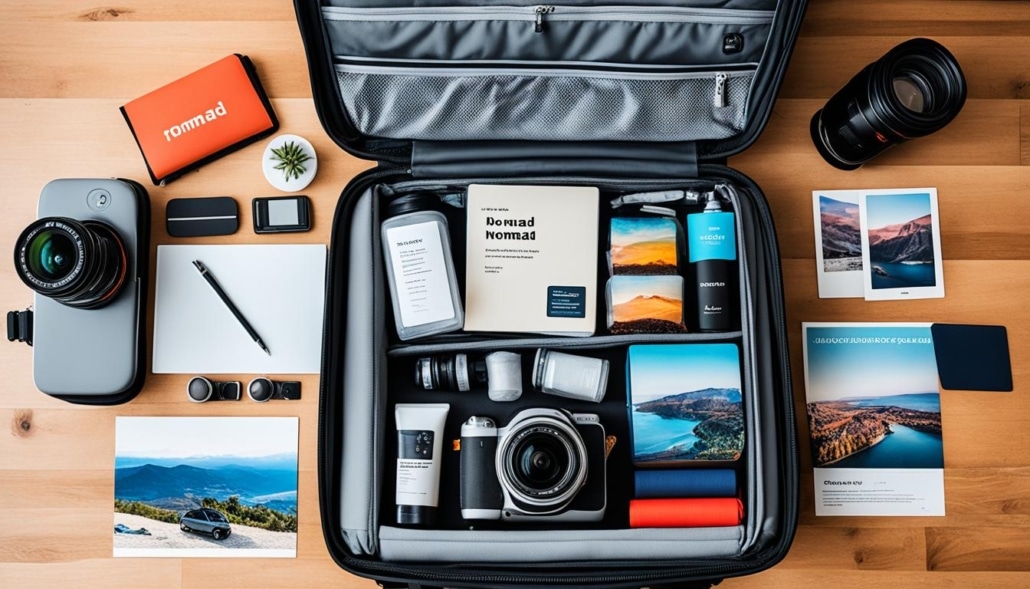Digital nomads are constantly on the move, living a unique lifestyle that combines work and travel. One of the key skills that can greatly enhance the digital nomad lifestyle is learning new languages. Communication skills are crucial for building connections, navigating local experiences, and expanding opportunities both personally and professionally.
Key Takeaways:
- Learning languages as a digital nomad can provide access to more business networking opportunities.
- Speaking the local language helps in better navigation of local experiences.
- Language learning can overcome loneliness and create deeper connections with locals.
- Knowing the local language helps in appearing polite and respectful.
- Language skills increase employability and open up diverse career opportunities in remote work.
Reasons to Learn a New Language as a Digital Nomad
As a digital nomad, learning a new language can provide you with numerous benefits and open up exciting opportunities in your work and personal life. Here are some compelling reasons why learning a new language is essential for digital nomads:
- Access to more business networking opportunities: Speaking the local language allows you to connect with locals and expand your professional network. By understanding the local language, you can build rapport, establish trust, and explore potential business collaborations.
- Better navigation of local experiences: Knowing the local language enables you to navigate your surroundings more efficiently. Whether it’s ordering food, asking for directions, or engaging in cultural activities, speaking the language will enhance your overall travel experience.
- Safety and legality: Understanding the local language can help you navigate legal and safety regulations in different countries. It allows you to communicate effectively with authorities, ensuring a smooth and hassle-free experience.
- Overcoming loneliness: Speaking the local language helps combat feelings of loneliness and isolation. It enables you to connect with locals, make friends, and establish meaningful relationships, providing a sense of belonging wherever you go.
- Deeper connections with locals: Learning the local language allows you to connect with locals on a deeper level. It shows respect for their culture, fosters authentic interactions, and creates opportunities for meaningful conversations and cultural exchanges.
- Appearing polite: Speaking the local language demonstrates your respect for the host country and its culture. Locals appreciate the effort and are often more open and welcoming when you make an effort to communicate in their language.
- Increasing employability: Knowing a foreign language can give you a competitive edge in the job market. It enhances your employability, especially in roles that require cross-cultural communication or dealing with international clients.
- Exercising the brain: Learning a language is a mentally stimulating activity that exercises your brain. It has been linked to improved memory, cognitive skills, and overall brain health.
- Saving money: By speaking the local language, you can negotiate better prices, avoid tourist traps, and find more affordable accommodation and services. It empowers you to make informed decisions and save money during your travels.
By acquiring language skills as a digital nomad, you gain the ability to understand business needs, build connections, navigate local experiences, and connect with others on a deeper level. It is an invaluable asset that enriches your travel experiences and enhances your professional capabilities.
Benefits of Learning a New Language as a Digital Nomad
| Benefits | Description |
|---|---|
| Access to more business networking opportunities | Build rapport, trust, and explore collaborations with locals |
| Better navigation of local experiences | Efficiently communicate, order food, ask for directions, and engage in cultural activities |
| Safety and legality | Navigate legal and safety regulations, communicate with authorities |
| Overcoming loneliness | Connect with locals, make friends, and establish meaningful relationships |
| Deeper connections with locals | Foster authentic interactions, meaningful conversations, and cultural exchanges |
| Appearing polite | Show respect for the host country and its culture |
| Increasing employability | Enhance your job prospects, especially in cross-cultural roles |
| Exercising the brain | Improve memory, cognitive skills, and brain health |
| Saving money | Negotiate better prices, avoid tourist traps, and find affordable services |
How to Learn a New Language: Course Options and Apps
Once a digital nomad decides to learn a new language, they have a variety of options at their disposal. Language center courses, online courses, books, and language learning apps all serve as effective tools for language acquisition. These resources cater to different learning styles and preferences, allowing individuals to find the method that suits them best.
Language Center Courses
Language center courses provide structured and comprehensive language learning programs. Whether it’s a physical language school or an online platform, these courses offer a systematic approach to language learning. They often include interactive lessons, exercises, and assessments to help learners gauge their progress.
Online Courses
Online language courses offer the flexibility of learning at your own pace and in your preferred location. They provide access to a wide range of languages, allowing digital nomads to choose the language that aligns with their travel plans. Online courses often incorporate multimedia materials, interactive exercises, and access to language tutors for personalized feedback.
Books
Traditional language learning through books remains a popular choice for many. Language learning books provide a structured curriculum, grammar explanations, vocabulary lists, and exercises. They are particularly useful for individuals who prefer self-paced learning and enjoy studying independently.
Language Learning Apps
Language learning apps have gained immense popularity due to their convenience and accessibility. These apps can be downloaded on smartphones and tablets, enabling digital nomads to learn on the go. There is a wide variety of language learning apps available, each offering unique features and methods. Some popular options include:
- Duolingo
- Babbel
- Tandem
- 50 Languages
- Italki
- LingoLearn
Language learning apps offer a range of features, such as vocabulary practice, pronunciation guidance, conversation practice with native speakers, and online lessons with certified teachers. These apps provide a flexible and interactive approach to language learning, making it engaging and enjoyable.
When choosing a language learning method, it’s important to consider personal preferences, learning style, and motivation. Setting clear goals, creating a study plan, and regularly practicing the language are essential for effective language acquisition. With the abundance of language learning tools and resources available, digital nomads have ample opportunities to embark on their language learning journey and enhance their cultural experiences.
The Most Important Languages to Learn for Remote Work
When it comes to remote work, possessing language skills that are in high demand can significantly enhance your career opportunities in a globalized job market. Here are some of the most important languages to learn for remote work:
| Language | Usage | Career Opportunities |
|---|---|---|
| Mandarin | Spoken by over 900 million people | Business communication across China and other Mandarin-speaking countries |
| German | One of the most widely spoken languages in Europe | Translation, customer support, and tourism industry |
| Portuguese | Official language in several countries, including Brazil and Portugal | E-commerce, digital marketing, and localization |
| Japanese | Language of technology and innovation | Software development, video game localization, and cultural consulting |
| Spanish | Second most spoken language globally | Translation, customer service, and international business |
| Korean | Demand increasing due to K-Pop, K-Dramas, and technology | Localization, content creation, and entertainment industry |
| Arabic | Spoken across the Middle East and North Africa | Translation, international diplomacy, and oil industry |
| Hindi | One of the most widely spoken languages in India | Outsourcing, customer support, and digital marketing |
| Russian | Official language in Russia and widely spoken in Eastern Europe | Translation, content writing, and technical support |
Knowing these languages can provide opportunities for diverse career paths such as translation, tour guiding, and business communication across countries. With the growing demand for language skills in remote work, becoming fluent in these languages can make you more marketable and valuable in the global job market.
Why You Should Learn Languages While Traveling as a Nomad
Learning languages while traveling as a nomad offers numerous benefits that enhance your overall travel experience. Not only does it allow you to communicate with locals more effectively, but it also opens up a world of opportunities for deeper connections, cultural understanding, and personal growth.
- Expanding your social circle: By learning the local language, you can connect with people from different backgrounds and cultures, expanding your network and creating lifelong friendships.
- Better navigation of local experiences: Knowing the language enables you to navigate local markets, transportation systems, and attractions more efficiently, saving you time and money.
- Showcasing respect to the locals: Making an effort to speak the local language shows respect and appreciation for the host country’s culture and people.
- Enhancing networking opportunities: Speaking the local language can open doors to business opportunities, collaborations, and cultural exchanges, allowing you to make valuable connections in your industry.
- Expanding your worldview: Learning languages exposes you to different perspectives, customs, and ways of life, broadening your understanding of the world and fostering cultural empathy.
Learning languages while traveling is like unlocking hidden doors, enabling you to connect with locals on a deeper level and experience a destination from an insider’s perspective.
Not only does language learning offer practical benefits, but it also enriches your travel experience by adding depth and authenticity. By engaging with locals in their native language, you can engage in engaging conversations, uncover local recommendations, and embark on unique adventures that may not be accessible to non-speakers.
Tips for Learning a New Language While Traveling
Learning a new language while traveling can be an exciting and rewarding experience for digital nomads. It allows you to connect more deeply with the local culture, improve your communication skills, and enhance your overall travel experience. Here are some practical tips to help you make the most out of your language learning journey:
- Use language learning apps: Take advantage of language learning apps like Duolingo, Babbel, and Tandem. These apps offer interactive lessons, vocabulary practice, and even the opportunity to connect with native speakers for conversation practice.
- Find a private tutor or language school: Consider enrolling in language classes or hiring a private tutor to get personalized guidance and instruction. This can help you improve your pronunciation, grammar, and overall language proficiency.
- Immerse yourself in the local culture: Immerse yourself in the local environment and surround yourself with native speakers. Engage in conversations with locals, visit local markets, and participate in cultural activities to practice your language skills in real-life situations.
- Seek out opportunities to practice: Look for opportunities to practice speaking with native speakers. Join language exchange events, find conversation partners, or participate in language meetups to practice your language skills and receive feedback.
- Incorporate the language into daily activities: Make an effort to use the language in your daily activities. Label objects in your environment with their corresponding foreign language names, listen to podcasts or music in the target language, and try to think and express yourself in the language as much as possible.
- Focus on the most important aspects: Identify the most crucial aspects of the language that will be useful for your travel purposes. Focus on learning vocabulary related to directions, ordering food, asking for help, and other practical phrases that will enhance your travel experience.
- Don’t be afraid to make mistakes: Remember that making mistakes is a natural part of the language learning process. Embrace your mistakes as learning opportunities and don’t be afraid to use the language, even if you’re not perfectly fluent. Native speakers will appreciate your effort and willingness to communicate.
By following these tips, you can effectively learn a new language while traveling and enrich your digital nomad experience. Remember to stay motivated, practice regularly, and enjoy the journey of discovering a new language and culture as you explore the world.
Conclusion
Learning languages as a digital nomad is a valuable pursuit that can greatly enhance your travel experiences and open up new opportunities for personal and professional growth. By acquiring the ability to communicate in the local language, digital nomads can navigate their surroundings with ease, establish meaningful connections with locals, save time and money, expand their business network, and gain a deeper understanding and appreciation of different cultures.
With the abundance of language learning tools and resources available, incorporating language learning into your travel lifestyle is easier than ever. Whether you choose to enroll in language center courses, use language learning apps like Duolingo or Babbel, or engage in conversation exchange through platforms like Tandem or Italki, there are countless options to suit your preferences and goals. The key is to stay motivated, set achievable goals, and practice regularly to continuously improve your language skills.
Even after moving to a new location, you can continue honing your language abilities and expanding your linguistic repertoire. The knowledge and proficiency gained in multiple languages not only enrich your travel experiences but also unlock a world of possibilities in the job market. Employers value language skills, especially in remote work scenarios, as they enable effective communication and bridge cultural gaps, making you a more valuable asset overall.
FAQ
What are the benefits of learning a new language as a digital nomad?
Learning a new language as a digital nomad can provide benefits such as access to more business networking opportunities, better navigation of local experiences, safety and legality, overcoming loneliness, deeper connections with locals, appearing polite, increasing employability, exercising the brain, and saving money.
What options are available for language learning?
There are several language learning options available including language center courses, books, and language learning apps such as Duolingo, Babbel, Tandem, and Italki.
Which languages are popular for remote work?
Popular languages for remote work include Mandarin, German, Portuguese, Japanese, Spanish, Korean, Arabic, Hindi, and Russian.
How can learning languages benefit digital nomads?
Knowing the local language can provide opportunities for fun interactions with locals, create lifelong friendships, help nomads become savvy travelers, open up unique activities and experiences, and make them feel more integrated and respected in the local community.
What tips do you have for learning a new language while traveling?
Some tips for learning a new language while traveling include using language learning apps, finding a private tutor or language school, immersing yourself in the local culture, seeking out opportunities to practice speaking with native speakers, incorporating the language into daily activities, focusing on the most important aspects of the language for travel purposes, and not being afraid to make mistakes.




















